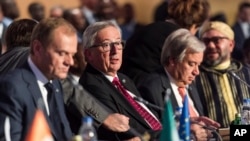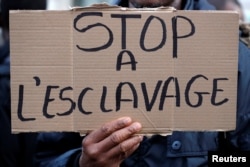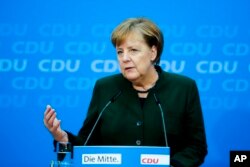Europe and Africa have joint responsibility for making migration more humane and orderly so they can end horrifying abuses being committed against African migrants by people smugglers, European Council President Donald Tusk said on Wednesday.
He was speaking at a two-day Africa-European Union summit that was meant to focus on development and investment in youth, but had inevitably been overshadowed by the migrant crisis.
Reports this month of white Libyan slave traders selling black African migrants at markets in Libya - a grim echo of the trans-Saharan slave trade in centuries past - have drawn worldwide horror.
The outcry threatened to put migration to the top of the summit agenda and shine a light on a thorny issue for European leaders faced with a surge in far-right, anti-immigration parties at home.
"It is clear that migration is a joint responsibility. It is in all our interests to have orderly migration that is more controlled, more humane and sustainable," Tusk said in his opening remarks.
"The recent reports about the treatment of Africans - especially young people - by smugglers and traffickers are horrifying," he said, adding that 5,000 migrants had drowned in the Mediterranean last year.
Soon after CNN aired grainy images from Libya this month appearing to show migrants being sold as slaves, African governments began recalling diplomats from Tripoli.
Protests erupted in France, Senegal and Benin. Ivory Coast President Alassane Ouattara called for Libyan slave traders to be prosecuted by the International Criminal Court.
"Let's work together to bring more humane solutions to this migration crisis that taints relations between the North and the South," said Guinea's president, Alpha Conde, the chairman of the African Union.
Libya has promised to investigate the reports, but many African citizens also blame European policies for abuses along the migrant trail.
"The worst we can do is to start the blame game. What we need now are common solutions and stronger cooperation to save lives, protect people," Tusk said. "Our common duty is to step up the fight against these unscrupulous criminals."
But European leaders - including German Chancellor Angela Merkel and French President Emmanuel Macron, who head the Franco-German axis at the heart of the EU - are hamstrung by electorates that are increasingly anti-immigration.
Despite pressure at home, Merkel on Wednesday highlighted the need to create legal avenues for migration.
However, Gunter Nooke, her special envoy for Africa, later told Reuters that alone would not solve the problem. "There wetalk about thousands, tens of thousands. But with (illegal) migration we talk about millions."
He added that no country is going to allow hundreds of thousands of students in from developing nations unless they can be sure most will go back within four years, which he said rarely happened.
In a joint statement, the United Nations, African Union and European Union announced the creation of a joint task force "to save and protect lives of migrants and refugees along the routes and in particular inside Libya," and to speed up returning migrants to countries of origin.
European and African leaders met late on Wednesday to discuss the reports of slavery in Libya and the migrant crisis.
"We must not only denounce it, we must act, by collectively attacking these smuggling networks," Macron, who has called the abuses in Libya a crime against humanity, said at the meeting. "We are going to ... to carry out targeted sanctions."







